22 Impressive Benefits Of Olive Oil, How To Select, & Caution
Make the most of the rich antioxidants found in this lightweight oil!
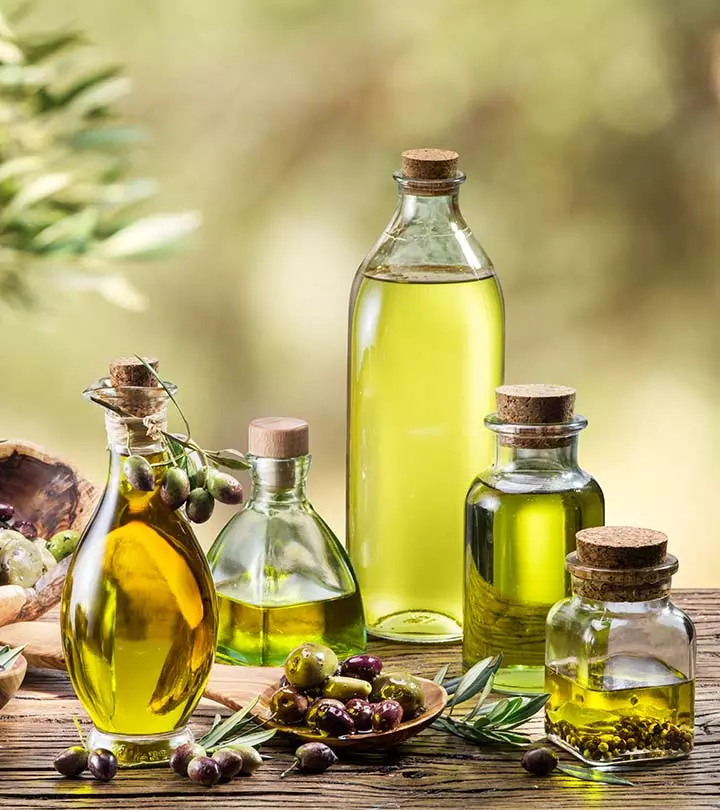
Image: Shutterstock
Olive oil is the most recommended oil by health enthusiasts. Olive oil benefits are so many that there is no wonder calling it liquid gold, as addressed in ancient times. This wonderful oil can benefit your skin too.
It is more than just a regular kitchen staple.
Olive oil may aid in weight loss, reduce the risk of arthritis, cancer, and manage cholesterol levels. It also helps regulate blood sugar levels.
Mediterranean people consume olive oil the most as it is grown mostly there. The mortality rates due to cardiovascular diseases there are significantly low compared to other parts of the world, which signifies the positive impact of olive oil on health.
 Know Your Ingredient: Olive Oil
Know Your Ingredient: Olive OilWhat Is It?
A golden-colored, non-sticky oil that is extracted from olives and has a fruity or herb-like aroma.
What Are Its Benefits?
It strengthens bones, aids in weight loss, and reduces the risk of Alzheimer’s and diabetes.
Who Can Use It?
Anybody can use it except people with sensitive skin and olive allergy.
How Often?
You can use 1 to 2 tablespoons for cooking your meals daily.
Caution
Avoid putting olive oil on open wounds and cuts. Excess consumption may lead to weight gain, skin rash, acne, and diarrhea.
Are you ready to explore the wide range of benefits this oil offers? Then please scroll down to know more about olive oil – uses, benefits, uses, and risks.
In This Article
Olive Oil — A Brief
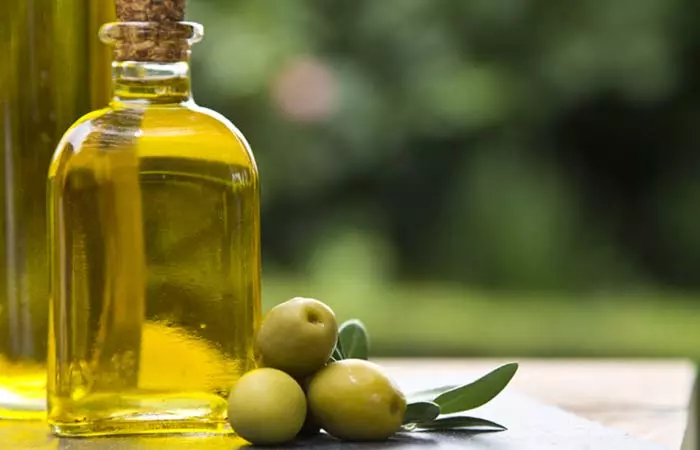
Scientific Name – Olea europaea
Family – Oleaceae
Native – Mediterranean Basin
Olive oil is extracted from the olive fruit. From ruling our kitchens to taking over the cosmetic world, olive oil has become a rage all over the world in recent times.
When you go shopping, a good variety of olive oils catch your attention. If you are wondering what they are all about, the next few minutes will give you an insight into that.
- Virgin Olive Oil – The most popular variety, virgin olive oil is a well-known cooking oil with a surprisingly low acid content. It is best suitable for people who want to enjoy the benefits of olive oil without spending a bomb.
- Extra Virgin Olive Oil – Made by cold pressing olive fruit, this oil is considered to be the best for our body. But mind you, not everybody can afford to use extra virgin oil due to its high cost.
- Pure Olive Oil – This oil is actually an amalgamation of refined and virgin olive oils. It has a high acidic content, and hence is unsuitable for use.
- Lampante Oil – The type that is used only as a fuel and is not suitable for cooking.
Apart from the ones on the list, there’s another type of olive oil – pomace olive oil. Pomace olive oil benefits include a unique set of advantages distinct from other types of olive oil. It’s good for cooking and may keep your heart healthy.
 Trivia
TriviaOlive oil’s rich nutritional profile is one of the reasons why it is popular among consumers today. Find out more about it in the next section.
Key Takeaways
- Olive oil can help improve heart health and brain function.
- It may reduce the risk of cancer and Alzheimer’s.
- It contains healthy fats that keep you satiated and aid weight management.
- Store it in a cool, dark place to retain its nutrients and effectiveness.
Nutritional Value Of Olive Oil
According to the United States Department of Agriculture, 100 grams of olive oil contains the following nutrients (1):
| Nutrients | Amount |
| Energy | 884 Kcal |
| Total lipid (Fat) | 100 g |
| Calcium | 1 mg |
| Iron | 0.56 mg |
| Potassium | 1 mg |
| Sodium | 2 mg |
| Choline | 0.3 mg |
| Vitamin E (alpha-tocopherol) | 14.35 mg |
| Vitamin K (phylloquinone) | 60.2 mcg |
| Total saturated fatty acids | 13.808 g |
| Monounsaturated fatty acids | 72.961 g |
| Polyunsaturated fatty acids | 10.523 g |
You can also compare sunflower oil vs olive oil to determine which is better suited for your dietary and cooking needs. Now that you know the types and nutritional facts, let’s move on to the benefits.
The Many Benefits Of Olive Oil
Skin Benefits Of Olive Oil
You are watching a video on YouTube when up pops an advertisement where a celebrity is bragging about her favorite skin cream while convincing you how it worked for her. And you rushed to a cosmetic shop to buy the cream, only to realize it is wildly expensive. What if we told you olive oil offers the same benefits as some of the costly cosmetic products in the market?
Learn how to use olive oil for skin to harness its moisturizing and nourishing properties effectively. Here’s why you should prefer olive oil over all the chemical-laden skin creams in the market.
1. Moisturizes Skin

Before we proceed, I have a few questions in mind.
Do you religiously go for an in-house moisturizing session after every shower?
Do you finish a bottle of body lotion within a month?
Are you willing to experiment with some natural product in place of your regular branded lotion? A solution that will last longer without as many side effects?
If you replied in the affirmative to at least one or all of my questions, go for olive oil.
The nutritional value of olive oil comes from its rich vitamin E content, an antioxidant that protects the skin from various external factors like the harsh sunrays or the wind (1), (2). Achieve sun protection along with improved skin complexion and skin texture with this wonderful oil. The light texture of olive oil makes it a perfect non-sticky moisturizer that stays for long and suits all skin types (3).
What You Need
1 spoon of extra virgin olive oil
What You Need To Do
1. After you have showered, leave your skin a little damp and massage the olive oil onto your face.
2. Leave it on for about 15 minutes, and then wash off with lukewarm water.
Note: If you have dry skin, apply the oil to your face before going to bed, and let it stay on overnight. You can remove the oil in the morning with the help of a gentle face wash and some warm water.
2. Improves Skin Health
When it comes to beauty, most of us swear by natural ingredients. All we want is glowing skin. No matter how many creams are there on your shelf, for a quick fix, we always reach out for a fruit pulp or a vegetable juice extract.
How can olive oil help?
Olive oil contains vitamin E, which improves skin health by treating inflammation, acne, and protecting the skin from serious ailments like psoriasis and skin cancer (4),(5),(6). Anecdotal evidence suggests that it may help boost skin elasticity.
Honey acts as a humectanti A substance that helps retain and maintain moisture. Cosmetics, skincare, and other personal care products frequently contain humectants. while yogurt does the job of a gentle exfoliant, thereby enhancing skin health (7),(8),(9).
What You Need
- 1/3 cup of yogurt
- ¼ cup of honey
- 2 teaspoons of olive oil
What You Need To Do
- Mix the ingredients thoroughly till you get a thick solution.
- Apply this solution on your face and leave it on for about 20 minutes.
- Wash it off with lukewarm water.
You can follow this remedy once a week. You may also observe skin brightening effects.
3. Helps Remove Makeup
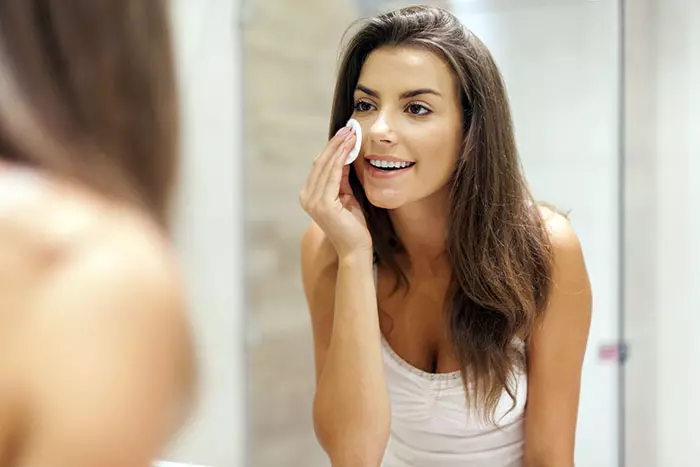
Are you in a dilemma over your makeup remover brand? Don’t fret.
Virgin olive oil is an easy and comparatively cheap alternative to market brands. Besides, where can you find a product that does the job without harming your skin? I always recommend natural remedies as I have sensitive skin that suffers blisters or rashes if there’s the slightest variation in the products.
What You Need
- 1/3 cup of yogurt
- ¼ cup of honey
- 2 teaspoons of olive oil
What You Need To Do
- Dip a couple of cotton balls in olive oil and rub them over your face to remove makeup.
- You can also moisten a cotton pad with olive oil and use it to remove makeup on your eyes. In addition to removing makeup, the oil can also soften the skin around your eyes.
4. Has Anti-Aging Properties
As you age, your skin starts to sag and develop wrinkles. You can delay these signs of aging with olive oil. This oil also helps with skin nourishment.
What You Need
- 2 tablespoons of olive oil
- 1 tablespoon of lemon juice
- A pinch of sea salt
What You Need To Do
- Massage your face with a few drops of olive oil.
- Mix the remaining oil with sea salt to make an exfoliant.
- Add the lemon juice for a refreshing feeling.
- Rub this mixture on those areas on your face that are dry, rough, and scaly.
5. As A Lip Scrub
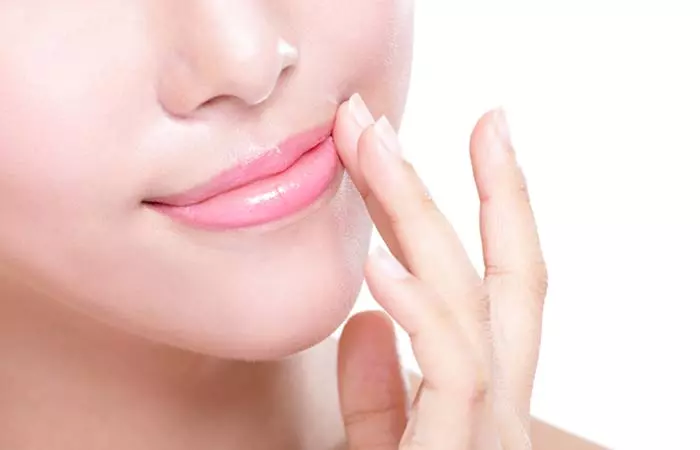
We live in a world of Instagram and Facebook, where we proudly post our selfies, showing off our pout. And if it has to be a pretty picture, you might as well take care of your lips.
Did you know olive oil can make your lips supple and pretty?
What You Need
- Crushed brown sugar
- A few drops of olive oil
- A dash of lemon juice
What You Need To Do
- Mix the ingredients and scrub your lips for five minutes just before you head to bed.
- Olive oil helps smoothen your chapped lips. Sugar and lemon act as exfoliating agents.
6. Heals Cracked Heels
If your cracked heels are stopping you from putting your best foot forward (pun intended!), try olive oil. Exfoliate your heels using hot lemon water and rub olive oil on them generously for added moisture and smoothness. You can wear socks for quick relief. Anecdotal evidence suggests that olive oil may boost skin regeneration.
Now that you know how olive oil benefits your skin, don’t you want to know how it can benefit your hair? Read on.
Hair Benefits Of Olive Oil
I have envied Rapunzel’s long tresses ever since I was a kid. I’m sure many of you can relate to what I am talking about. What if I told you it’s not so difficult to get thick, long hair like Rapunzel? Excited? Read on to know how.
7. Keeps Hair Healthy

Olive oil, in combination with a few other ingredients, can work wonders to keep your hair healthy. The oil is rich in vitamin E that helps fight hair loss (10). Honey moisturizes your hair. It also contains other nutrients like magnesium, zinc, sulfur, calcium, and B vitamins that aid hair growth (11). The egg yolk is rich in protein, a nutrient that is the primary constituent of hair (12). This pack may help boost hair strength and enhance hair shine while reducing split ends.
What You Need
- ½ a cup of olive oil
- 2 tablespoons of honey
- A egg yolk
What You Need To Do
1. Mix the ingredients thoroughly till you get a smooth paste.
2. Apply this paste to your hair and leave it on for about 20 minutes.
3. Wash off with lukewarm water, and then follow up with a conditioner.
8. Can Be Used As A Pre-shampoo Treatment
I remember, as a kid, my mom gave me an oil massage before a shampoo so my hair could imbibe the goodness of the oil. Though I hated being all oily at that time, eventually, I understood how important this process was for my hair.
An olive oil massage before a shampoo helps in giving a distinct shine and strength to your hair. It may help improve hair elasticity and reduce hair damage.
What You Need
A small cup of olive oil
What You Need To Do
1. Heat a cup of olive oil and apply it on your hair generously, especially on the scalp and the ends.
2. Leave it on for 20 minutes and wash off with lukewarm water.
Olive oil moisturizes your hair and reduces scalp irritation.
Sunny, a beauty blogger, was looking for a solution for oily hair and although treating oil with oil did not seem like the best idea, she gave it a try anyway. She writes, “I rubbed some olive oil on my scalp when I did my olive oil treatment the next time and guess what? My scalp had never felt so clean before (i)!” She recommends keeping the oil on for at least half an hour to reap all its nourishing benefits.
Health Benefits Of Olive Oil
Olive oil’s health benefits are not limited to just enhancing your beauty. You can derive a lot of health benefits by including this oil in your diet as well.
9. Improves Nail Health
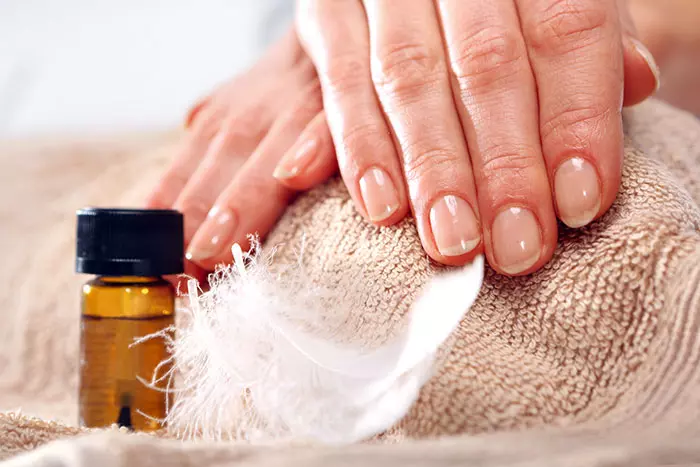
Nails can say a lot about your health. If you look pale, doctors often check your nails. Dull, lifeless, brittle nails are a few problems we encounter. But did you know olive oil can actually improve nail health? If you are planning to flaunt that trendy nail art for your best friend’s wedding, you need to first start caring for your nails so they look healthy.
The vitamin E in olive oil can improve the appearance of nails affected by an ailment(13).
What You Need
2 to 3 tablespoons of olive oil
What You Need To Do
1. Simply dip a cotton ball in olive oil and dab it on your nails.
2. You can let it stay for about 30 minutes before washing it off with normal water.
 Did You Know?
Did You Know?10. Helps Prevent Breast Cancer
Olive oil and cancer — the correlation can be coined as absurd. But cooking with olive oil can help prevent breast cancer.
In a Saudi Arabian study, it was found that oleuropein, a natural compound found in olive leaf, has potential anti-breast cancer properties (14).
In another clinical trial conducted in Spain, it was found that women who consumed a diet containing olive oil were 62 percent less likely to contract breast cancer (15).
11. Helps Prevent Diabetes
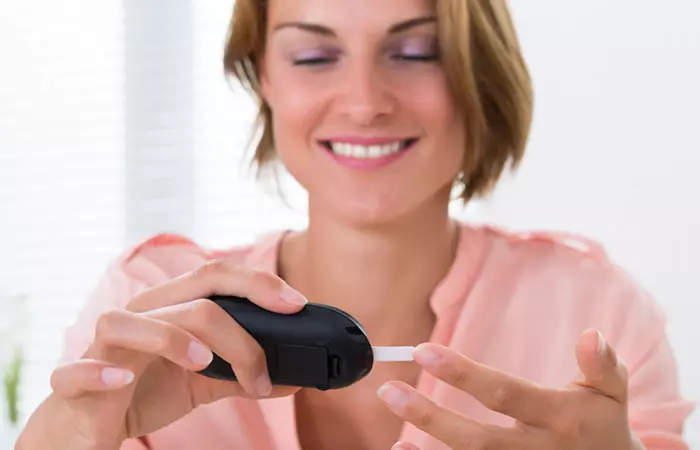
Including olive oil in your diet can also keep your blood sugar under control. Trust the many studies that prove this little fact.
According to the Harvard School of Public Health, a diet rich in mono and polyunsaturated fats, like the one that contains olive oil, can help prevent diabetes (16).
In another study published by The American Journal of Clinical Nutrition, consumption of olive oil was linked to a reduced risk of diabetes in women (17).
12. Prevents Alzheimer’s
According to the Scientific American, oleocanthal in olive oil can help prevent Alzheimer’s disease
(18). The American Chemical Society has also come up with similar findings(19).
In an American study, extra virgin olive oil was found to improve learning and memory in mice, supporting the possibility of its replication in humans suffering from Alzheimer’s (20).
13. Strengthens Bones
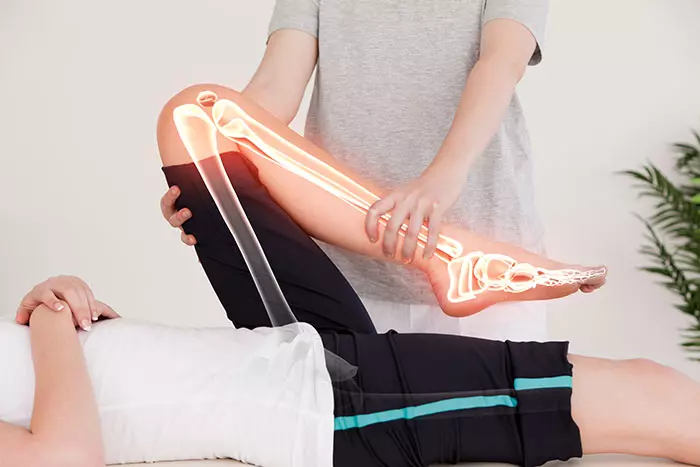
If you thought calcium alone made your bones strong. Here’s news — olive oil too can strengthen the bones.
In a study that involved men consuming a Mediterranean diet, it was found that olive oil might contribute to strong bones. Their blood was found to contain higher levels of osteocalcin, which was an indication of healthy bone formation (21).
14. Treats Depression
We all have our share of mood swings. Our state of mind depends on a lot of things. Thankfully, there are a few foods that act as antidepressants. And you can count olive oil among them.
One of the amazing benefits of olive oil is to treat depression. Olive oil can increase the levels of serotonin, the brain chemical. This, it has been found, is similar to the effect of some antidepressants (22).
15. Aids Weight Loss

Losing weight was never this easy. What if you could lose weight while snacking on your favorite food? No kidding here!
Have your favorite Italian pasta or a salad drizzled with olive oil and watch yourself go from flab to fab.
A study published in the Harvard School of Public Health had supported the efficacy of olive oil in aiding weight loss. The weight loss that occurred due to two different types of diets (a moderate-fat Mediterranean diet that includes olive oil, and a lowfat diet) were compared. By the end of the study, only 20 percent of the volunteers in the low-fat group were still following the diet.
16. Controls Cholesterol
Does olive oil lower cholesterol? Well, yes, you can lower the levels of bad cholesterol in your body by using of olive oil. But, is olive oil high in cholesterol?
Olive oil contains minimum levels of saturated and polyunsaturated fats. This property gives it the ability to control blood cholesterol levels in the body. Olive oil contains the highest level of monounsaturated fat – around 75-80%, which helps build good cholesterol and HDL in the body.
Oh no, I’m not stating this fact without scientific proof.
Research conducted at the University of Minnesota has shown that while Greek, Cretan, and other Mediterranean populations ate almost as much dietary fat as Americans, they had significantly lower rates of heart disease. The difference is being pointed to the Mediterranean’s consumption of extra virgin olive oil.
Universidad Autonoma de Madrid in Spain found in a study that an extra virgin olive oil rich diet lowered the levels of LDL cholesterol in the body. It is also linked to an increase in HDL (good) cholesterol in the human body.
Andreanna Rainville, a registered nurse (RN) and nutritional counselor (NC), says, “Genetics can play a role in determining how your body responds to lipids like olive oil and other dietary fats. For example, certain genetic variations may affect the way your body metabolizes fats and how much fat is stored in the body.”
She adds, “One genetic variation that can affect the way your body responds to lipid metabolism (how olive oil is metabolized) is the PPAR-alpha gene. This variant has been linked to increased sensitivity to monounsaturated fats, such as olive oil, which can lead to a reduction in total cholesterol andLDL cholesterol levels. This genetic variant may also affect the way that fat is stored in the body, leading to a decrease in the risk of obesity and related diseases.”
“Another genetic variation that can affect the way your body responds to olive oil is a variant in the APOA2 gene. This variant has been linked to increased sensitivity to monounsaturated fats, such as olive oil, which can lead to a reduction in triglyceride levels.”
Olive oil is rich in monounsaturated and polyunsaturated fats, which are considered good for your health. These fats are heart-healthy and help lower the LDL (bad cholesterol) levels in the body. In addition, replacing oils and fats that are rich in trans fats with these healthy fats helps increase HDL cholesterol levels. Check out the chart given below to understand the nutritional values of different fats and oils.
Nutritional Value Comparison Of Different Fats And Oils
Source: Iowa State UniversityRainville adds, “It’s important to note that while olive oil may have health benefits, it is high in calories, so it should be consumed in moderation as part of a balanced diet. Also, olive oil alone cannot “clear” the arteries, dissolve blood clots or cure any disease. It is important to have a healthy lifestyle, including regular physical activity, a balanced diet, and not smoking, as well as regular check-ups with a healthcare professional.”
17. Relieves Constipation

Use olive oil as a remedy for constipation.
Olive oil benefits the gastrointestinal tract and colon (23). The consistency and texture of olive oil help in stimulating your digestive system, making food move smoothly through the colon. When you take this oil on a regular basis, it helps in completely preventing constipation.
Olive oil is rich in monounsaturated fats (24). This helps in increasing mobility so that food can move through the colon without any problem. It also helps in speeding up bowel evacuation and prevents constipation.
This oil is rich in vitamins E and K, iron, omega-3 and 6 fatty acids and antioxidants. Anecdotal evidence suggests that antioxidants help in the detoxification of harmful compounds. These nutrients improve your overall health, including the digestive tract, and help prevent constipation as well.
How To Use
Olive oil can be used in many different ways for the treatment of constipation. Take a look:
1. Raw Olive Oil
Have one tablespoon of extra virgin olive oil twice a day. Take the first tablespoon in the morning on an empty stomach and the second one an hour before you go to bed. If you forget to take it while your stomach is empty, wait a few hours after you have eaten. Repeat this every day until constipation is relieved.
2. Olive Oil With Fruit
If you do not like the taste of raw olive oil, you can combine it with a fibrous fruit like apple or orange. First, take a tablespoon of the oil in the morning and then eat the fruit. If it does not help, take another tablespoon in the evening with veggies such as broccoli that are rich in fiber. Do this on a regular basis until you obtain relief.
3. Olive Oil With Orange Juice
Add one teaspoon of olive oil to a glass of orange juice and drink it every morning on an empty stomach. It will help in lubricating your system all day long and keeps you healthy. You can also try olive oil with a cup of coffee.
4. Olive Oil With Lemon Juice
Mixing a tablespoon of olive oil and a teaspoon of lemon juice is also an effective way to treat constipation naturally. Drink this mixture once every day. You can also take one teaspoon of olive oil with a wedge of lemon in the evening to lubricate your system and to keep your colon from drying while you sleep.
5. Olive Oil With Milk
This is a great remedy for severe constipation. All you need to do is add one tablespoon of extra virgin olive oil to a cup of warm milk. Mix it well and make sure your stomach is empty when you drink it. Do this regularly to get rid of constipation.
18. Helps Eliminate Kidney Stones
Olive oil consumption can also help dissolve kidney stones (25). Rainville says, “Olive oil is known to have a positive impact on cardiovascular health by reducing LDL cholesterol, blood pressure, and inflammation. It may also have a beneficial effect on kidney health. However, more research is needed to confirm these effects and to understand the underlying mechanisms.”
What You Need
- 2 ounces of lemon juice
- 2 ounces of olive oil
- Water
What You Need To Do
- Take around 2 quarts of water in a pan and heat it on a medium flame.
- Let it boil. Once it has reached the boiling point, remove from the heat.
- Add around 2 ounces of fresh lemon juice and some extra virgin olive oil.
- Mix properly and store the water in the refrigerator after it has completely cooled down.
19. Helps Dilute Ear Wax

Using olive oil to clean ear wax is a good idea (26).
To prevent the onset of cerumen impactioni A condition where ear wax builds and blocks the ear. When too much accumulates, it can damage hearing. , experts recommend using olive oil to remove wax from your ears. In most cases, when you try to clean impacted earwax, the hardened wax chunks move further back into the ear canal.
This is where olive oil comes in handy. It helps to soften the cerumen, making it easier for you to remove earwax. Once it has been sufficiently softened, the wax gets broken down into smaller pieces, and often moves to the outer edge of your air canal, where it can be safely and thoroughly cleaned with a soft cloth or tissue.
What You Need
- Olive oil
- A dropper
What You Need To Do
- Heat a small amount of the oil a little above room temperature. Warm olive oil will help break down the earwax. Make sure it is not too hot as it can burn your ear canal. It should be about as hot as your body, and not more than that.
- Fill a clean dropper with just a couple of drops of the oil. You do not need more than ¾ of a standard-sized dropper.
- Gently let the oil drop into your ear canal. Make sure your head is tilted sideways so that your ears are pointed upwards. Squeeze in one drop first, and if it feels alright, slowly dispense the remaining oil.
- Leave the oil to do its work for about 10 to 15 minutes. To help the oil penetrate, shift your ear canal by opening and closing your mouth gently. You can also massage the area under your ear. If you need to move, holding a cotton swab over your ear can prevent the oil from spilling out.
- Once the oil has softened the earwax, turn your head so that the oil can spill out. You can rinse it off by using a dropper filled with warm water to flush the oil out. You can also let water into your ear while showering and then let it drain out.
- Lastly, wipe off any excess oil from the outer part of your ear with a soft cloth or tissue.
You can repeat this method several times a week as required. While a few people say that it should be done two to four times a day, others recommend the treatment only a few times a week. It takes some patience with this remedy as it can take up to two weeks for even minor cases to clear up completely.
20. Prevents Strokes
You may not know this but the daily consumption of extra virgin oil can help prevent strokes in the elderly (27).
A study has shown that older people who adopted olive oil in their diet were 41% less susceptible to the risk of strokes. We all know that strokes occur due to blood clot in the blood vessels connecting to the brain, which can even lead to brain damage and, eventually, death. Olive oil helps in diluting these clots, ensuring proper blood flow to the brain.
A study was conducted on the cardiovascular benefits of consuming olive oil and found that olive oil can reduce the risk of strokes and cardiovascular diseases. Of the 18,266 participants of the cohort named SUN project, 261 total CVD cases were reported. It was further found that consuming a little more than 30g of olive oil daily reduced the risk of cardiovascular disease by 57%.
21. Perks Up Sex Life

Ever wondered why all the great love stories originated from Italy – the land of olive oil?
It’s no surprise that olive oil is an excellent aphrodisiaci A food ingredient that stimulates sexual desire, behavior, or pleasure. In some cases, it also helps treat erectile dysfunction. (28). A proper massage with olive oil enhances blood circulation to all parts of the body, including the sex organs.
22. Acts As A Pain Relief
Be it external or internal injury, extra virgin olive oil is known to relieve pain.
The presence of a compound called oleocanthal makes olive oil an anti-inflammatory agent that can cure any type of disease, be it topical or chronic (29). Studies have found that olive oil contains several polyphenols that exert anti-inflammatory effects. They support anti-oxidative stress and speed up the wound healing process (30).
How To Select And Store

Not mentioning the proper process of selection after enumerating the numerous benefits is like luring a kid with a candy without giving him one. Let’s take a look at the selection process of olive oil.
There are five things you need to keep in mind while choosing olive oil.
- The first thing you need to do is verify if it is extra virgin olive oil. Turn the bottle around and look for the term ‘extra virgin’. But then, there are other parameters too.
- Check where the oil is from. If you find a lot many countries listed on the backside label of the bottle, it is pretty obvious that the oil has traveled a long way before reaching the store, and there is a high possibility that it is degraded.
- Look for the harvest date. It is important to note that olive oil is unlike wine — it doesn’t get better with age. The oil can be good for about two years if stored in optimum conditions (inside a dark cupboard at room temperature). If you don’t see a harvest date mentioned anywhere, it’s better you replace the bottle on the rack and check for something else.
- Remember to smell it and taste it. Of course, you can’t do that at the store. But make sure you smell the oil and taste a little of it once you have brought it home. If you encounter any off-odors—that of old peanut butter, wax, or sweaty socks—return the oil to the store saying it is rancid.
- Favor domestic oil. Well, high-quality olive oil is produced all over the world. But, according to research, olive oils produced in the domestic country consistently score higher in quality than the imports.
- Mary Sabat, MS, RD, LD, says, “The American Heart Association recommends consuming up to two tablespoons of extra virgin olive oil per day as part of a healthy diet. I personally think that most olive oils are not just olive oil and contain other more inflammatory oils, so it is important to be careful which brand you choose if you are going to use 2 tablespoons a day.”
Storage
The storage of a product is as important as the selection, if not more.
Just note these simple pointers to ensure the longevity of your olive oil.
- Choose a cool and dark place to store the oil.
- Ensure the oil is away from heat, air, and light.
- Store the oil in a dark or opaque glass bottle, or a stainless steel container.
- Ensure the lid of the bottle is closed tight.
Trivia:
Thankfully, olive oil has a longer shelf life when compared to normal cooking oils. Some varieties can even last three years.
Cooking With Olive Oil
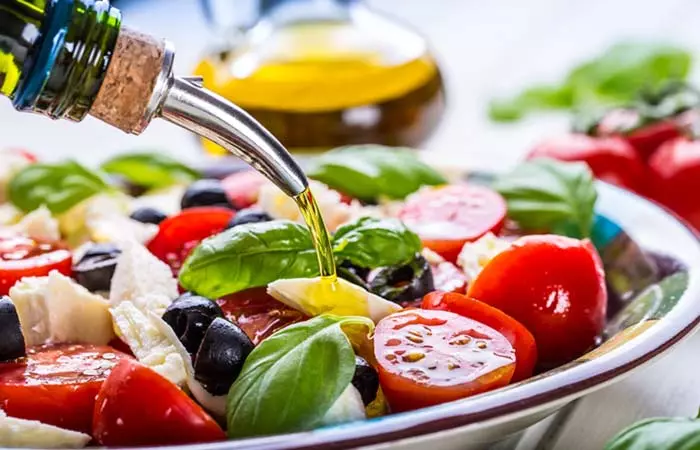
Olive oil is one of the few cooking ingredients that offers wholesome plant-based nutrition. Popular diets like the gluten-free diet and vegan diet feature this oil.
You can ideally use high-quality extra virgin olive oil as a perfect condiment with your meals. Here are a few culinary uses of this oil that can help you incorporate it seamlessly into your daily diet.
- Use olive oil to sauté vegetables, meats, and seafood.
- Use as a substitute for butter in your baking recipes.
- Drizzle olive oil on grilled meats and vegetables for added flavor.
- Add a drizzle of olive oil to finished pasta dishes.
- Use it as a dressing for salads.
- Use olive oil to make homemade mayonnaise.
- Mix olive oil with herbs, spices, or citrus zest for a flavorful bread dip.
NOTE:It is important to note that olive oil has a lower smoke point (the temperature at which the oil begins to break down, losing its beneficial properties) as compared to other oils. Also, extra virgin olive oil has a lower smoke point than normal olive oil. So, ensure that you use extra virgin olive oil for cooking on medium/low heat (between 250 to 350 degrees Fahrenheit).
A Word Of Caution
Though olive oil has a lot of benefits, it does have some side effects, which you cannot afford to ignore. Be aware of the side effects of olive oil to make informed choices and use it appropriately in your diet and skin care routine. Take a look:
- Olive oil can cause allergic reactions in certain individuals. When someone who is allergic to olive oil applies it on their skin, the immune system sets off to attack it. This causes the body to produce antibodies, resulting in common food allergy symptoms. People who are allergic to olive oil may developeczemai A typical condition in which the skin is rough, dry, and flaky. Common symptoms include itchiness and inflammation. and skin rashes that can prove to be itchy. Hence, it is always better to do a patch test before using the oil topically. In case of any allergic reaction, consult your allergist or dermatologist immediately.
- Since olive oil is rich in calories, its overconsumption can cause the risk of heart disease. According to Rainville, “A spoonful of olive oil per day can be a healthy addition to a balanced diet, but the appropriate amount of olive oil to consume per day can vary depending on individual factors, such as age, sex, and overall health.”
- If you are diabetic and going through a scheduled medication, consult your doctor before using oil. Olive oil may react with the medications and cause further drop in your sugar levels, which can be fatal.
- Using more than the advised quantity of olive oil can also cause a massive fall in your blood pressure levels, gallbladder blockage and several other diseases.
- Too much of olive oil may have a completely opposite effect on your weight, owing to the high fat content in the oil.
- Don’t heat olive oil for too long (more than 20 to 30 seconds) as it has a tendency to burn quickly, making it lose most of its beneficial properties.
- Never apply the oil to wounds or cuts without prior consultation.
- Decrease the dosage of oil when cooking for pregnant or lactating women.
Takeaway:Use olive oil for smooth, supple, and flawless skin. Scrubbing a bit of this oil on your lips and heels makes them even and pretty. This unique oil also makes your hair healthy and shiny. Olive oil has also proved to be very effective in curing diabetes, breast cancer, cardiovascular diseases, cholesterol, obesity, and kidney stones.
Infographic: Olive Oil And Brussel Sprouts Salad: A Must-Try Recipe
When consumed in moderation, olive oil packs a healthy punch and elevates the flavor of even the blandest foods. Check out the infographic for a super quick, easy, and delicious recipe that brings together Brussels sprouts and olive oil in a lip-smacking combination. Illustration: StyleCraze Design Team

Olive oil is not just a kitchen staple but also a popular cosmetic ingredient. This oil is rich in omega-3 and -6 fatty acids, antioxidants, vitamins E and K, and iron. Consumption of olive oil helps moisturize the skin, keeps your hair healthy, improves nail health, reduces the risk of breast cancer and diabetes, and strengthens bones. However, it may also cause allergic reactions in some people, and its overconsumption may increase heart disease risk. Hence, consume it in moderation and consult your doctor in case of any emergencies.
Frequently Asked Questions
Is avocado oil better than olive oil?
Both oils are highly nutritious sources of antioxidants and healthy fats. However, avocado oil has a higher smoke point than olive oil and can be used in high-heat cooking.
What is the difference between olive oil and virgin olive oil?
Unlike regular olive oil, virgin olive oil is always cold-pressed without chemicals and heat. Also, it contains more nutrients and its natural olive flavor is helpful in salad dressings. However, regular olive oil has a high smoking point, making it ideal for cooking rather than dipping or salad dressing.
Is olive oil good for allergies?
Much anecdotal evidence suggest that the polyphenols in olive oil can act as barriers to allergens. However, limited data is available to prove this claim.
Can I use olive oil every day on my face?
Olive oil is a viscous oil that can clog pores and lead to breakouts, especially in persons with oily or acne-prone skin. Hence, it is not recommended to use every day on your face.
Can olive oil go bad?
Yes, olive oil can spoil with time, just like any other food. The type of olive oil, the storage conditions, and the amount of exposure to air, heat, and light are some factors that affect the shelf life of olive oil.
Illustration: Impressive Benefits Of Olive Oil How To Select & Caution
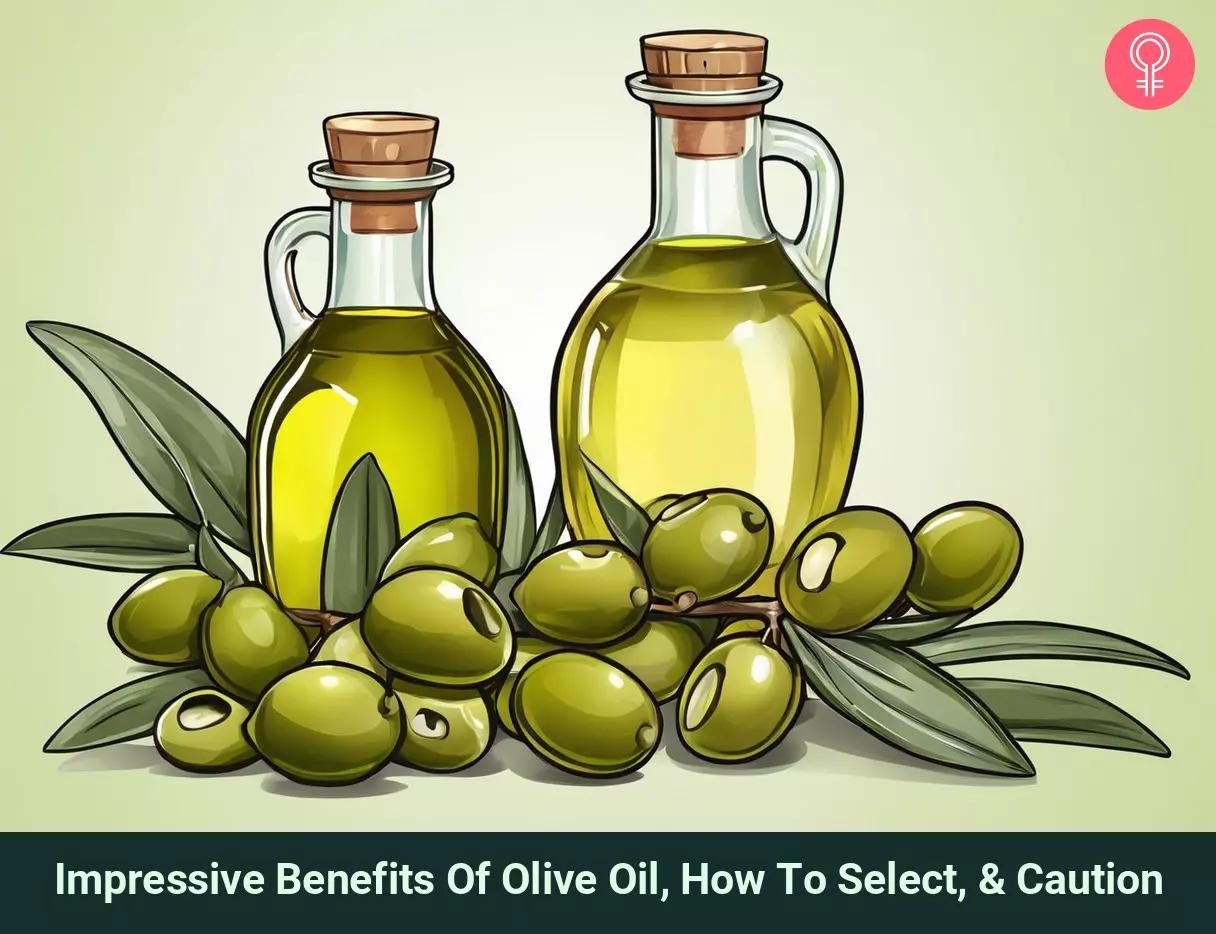
Image: Stable Diffusion/StyleCraze Design Team
Discover the amazing health benefits of olive oil. Check out this video to know how you can use this natural oil to improve your heart health, reduce inflammation, and more.
Personal Experience: Source
StyleCraze's articles are interwoven with authentic personal narratives that provide depth and resonance to our content. Below are the sources of the personal accounts referenced in this article.
i. TWO COUNTER-INTUITIVE WAYS OF DEALING WITH OILY SCALP (WITH ADDED BENEFITS FOR YOUR HAIR TOO!)https://mostlysunnybunny.wordpress.com/2012/03/02/two-counter-intuitive-ways-of-dealing-with-oily-scalp-with-added-benefits-for-your-hair-too/
References
Articles on StyleCraze are backed by verified information from peer-reviewed and academic research papers, reputed organizations, research institutions, and medical associations to ensure accuracy and relevance. Read our editorial policy to learn more.
- Olive oil
https://fdc.nal.usda.gov/fdc-app.html#/food-details/1103861/nutrients - The role of vitamin E in normal and damaged skin
https://pubmed.ncbi.nlm.nih.gov/7633944/ - Natural (Mineral Vegetable Coconut Essential) Oils and Contact Dermatitis
https://pubmed.ncbi.nlm.nih.gov/27373890/ - The role of vitamin E in normal and damaged skin
https://pubmed.ncbi.nlm.nih.gov/7633944/# - Vitamin E supplementation in inflammatory skin diseases
https://pubmed.ncbi.nlm.nih.gov/34655146/ - Vitamin E supplementation in inflammatory skin diseases
https://pubmed.ncbi.nlm.nih.gov/30899998/# - Honey in dermatology and skin care: a review
https://pubmed.ncbi.nlm.nih.gov/24305429/#: - Yogurt Production
https://pubmed.ncbi.nlm.nih.gov/30506248/# - Epidermal and dermal effects of topical lactic acid
https://pubmed.ncbi.nlm.nih.gov/8784274/# - Effects of Tocotrienol Supplementation on Hair Growth in Human Volunteers
https://www.ncbi.nlm.nih.gov/pmc/articles/PMC3819075/ - The Role of Vitamins and Minerals in Hair Loss: A Review
https://www.ncbi.nlm.nih.gov/pmc/articles/PMC6380979/ - The Health Benefits of Egg Protein
https://www.ncbi.nlm.nih.gov/pmc/articles/PMC9316657/# - Yellow nail syndrome in three siblings: a randomized double-blind trial of topical vitamin E
https://pubmed.ncbi.nlm.nih.gov/2064401/ - Olive oil oleuropein has anti-breast cancer properties with higher efficiency on ER-negative cells
https://pubmed.ncbi.nlm.nih.gov/23261678/ - Calorie intake olive oil consumption and mammographic density among Spanish women
https://www.ncbi.nlm.nih.gov/pmc/articles/PMC4166692/ - Types of Fat
https://nutritionsource.hsph.harvard.edu/what-should-you-eat/fats-and-cholesterol/types-of-fat/ - Effect of olive oil consumption on cardiovascular disease cancer type 2 diabetes and all-cause mortality: A systematic review and meta-analysis
https://www.clinicalnutritionjournal.com/article/S0261-5614(22)00355-7/fulltext#:~:text=Olive%20oil%20consumption%20was%20associatedd)%20without%20evidence%20of%20heterogeneity. - Olive-Oil-Derived Oleocanthal Enhances β-Amyloid Clearance as a Potential Neuroprotective Mechanism against Alzheimer’s Disease: In Vitro and in Vivo Studies
https://www.ncbi.nlm.nih.gov/pmc/articles/PMC3689195/ - Explaining how extra virgin olive oil protects against Alzheimer’s disease
https://www.acs.org/pressroom/presspacs/2013/acs-presspac-april-24-2013/explaining-how-extra-virgin-olive-oil-protects-against-alzheimers-disease.html - Extra virgin olive oil improves learning and memory in SAMP8 mice
https://pubmed.ncbi.nlm.nih.gov/21955812/ - A Mediterranean Diet Enriched with Olive Oil Is Associated with Higher Serum Total Osteocalcin Levels in Elderly Men at High Cardiovascular Risk
https://www.ncbi.nlm.nih.gov/pmc/articles/PMC3462931/# - Role of Monoaminergic System in the Etiology of Olive Oil Induced Antidepressant and Anxiolytic Effects in Rats
https://www.ncbi.nlm.nih.gov/pmc/articles/PMC3725699/ - The fate of olive oil polyphenols in the gastrointestinal tract: implications of gastric and colonic microflora-dependent biotransformation
https://pubmed.ncbi.nlm.nih.gov/16753843/ - Virgin olive oil as a fundamental nutritional component and skin protector
https://pubmed.ncbi.nlm.nih.gov/19167997/# - Antiurolithic effect of olive oil in a mouse model of ethylene glycol-induced urolithiasis
https://www.ncbi.nlm.nih.gov/pmc/articles/PMC5419107/# - Ototoxicity of olive oil in a chinchilla animal model
https://pubmed.ncbi.nlm.nih.gov/23616417/# - Olive oil consumption is associated with a lower risk of cardiovascular disease and stroke
https://pubmed.ncbi.nlm.nih.gov/34872046/ - The role of omega-3 fatty acids contained in olive oil on chronic inflammation
https://pubmed.ncbi.nlm.nih.gov/21785178/# - Influence of heat on biological activity and concentration of oleocanthal–a natural anti-inflammatory agent in virgin olive oil
https://pubmed.ncbi.nlm.nih.gov/19166297/# - Anti-Inflammatory and Restorative Effects of Olives in Topical Application
https://www.ncbi.nlm.nih.gov/pmc/articles/PMC8257351/
Read full bio of Alexandra Dusenberry
- Andreanna Rainville, RN, NC, is a registered nurse and nutritional counselor with 12 years of experience in chronic illness, pain management, and chronic infections. She focuses on genetics and methylation evaluation and support, nutraceutical medicine, diet therapy, immunotherapy, chronic illness and infection, detoxification, fertility, mold, pain management, and pediatrics (and is currently finishing her MAPS (Medical Academy for Pediatrics with Special Needs) fellowship.
 Andreanna Rainville, RN, NC, is a registered nurse and nutritional counselor with 12 years of experience in chronic illness, pain management, and chronic infections. She focuses on genetics and methylation evaluation and support, nutraceutical medicine, diet therapy, immunotherapy, chronic illness and infection, detoxification, fertility, mold, pain management, and pediatrics (and is currently finishing her MAPS (Medical Academy for Pediatrics with Special Needs) fellowship.
Andreanna Rainville, RN, NC, is a registered nurse and nutritional counselor with 12 years of experience in chronic illness, pain management, and chronic infections. She focuses on genetics and methylation evaluation and support, nutraceutical medicine, diet therapy, immunotherapy, chronic illness and infection, detoxification, fertility, mold, pain management, and pediatrics (and is currently finishing her MAPS (Medical Academy for Pediatrics with Special Needs) fellowship.
Read full bio of Ravi Teja Tadimalla
Read full bio of Arshiya Syeda
Read full bio of Aparna Mallampalli







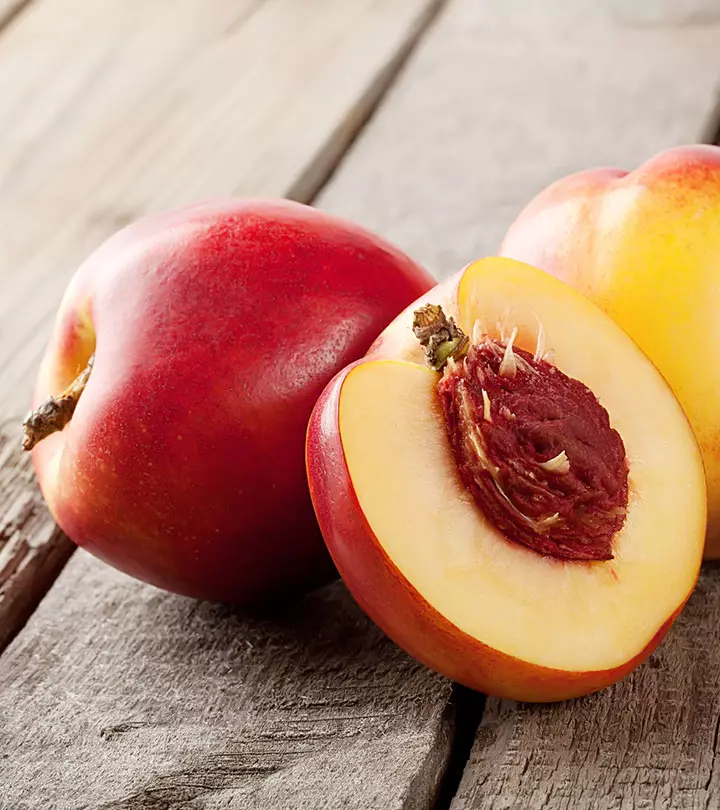
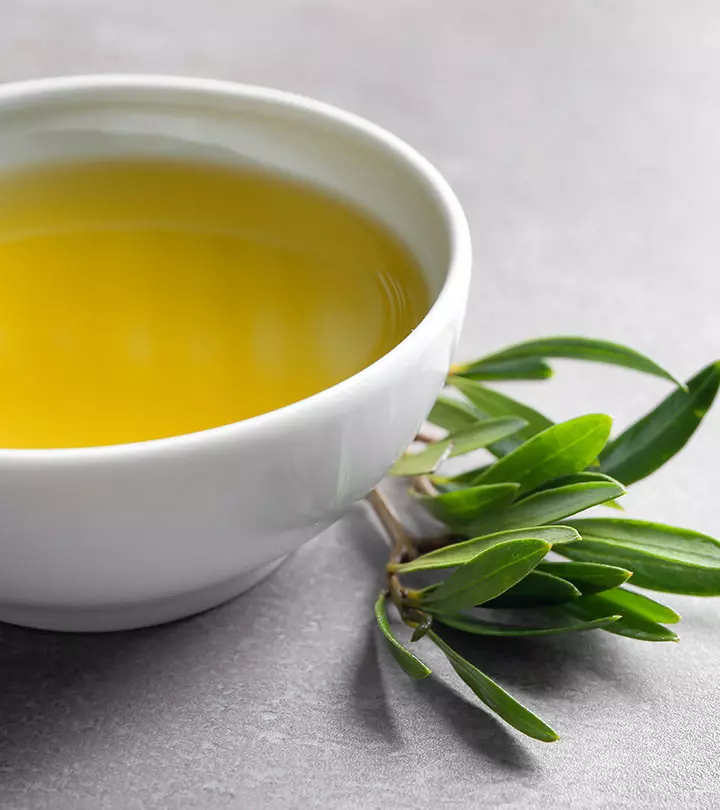

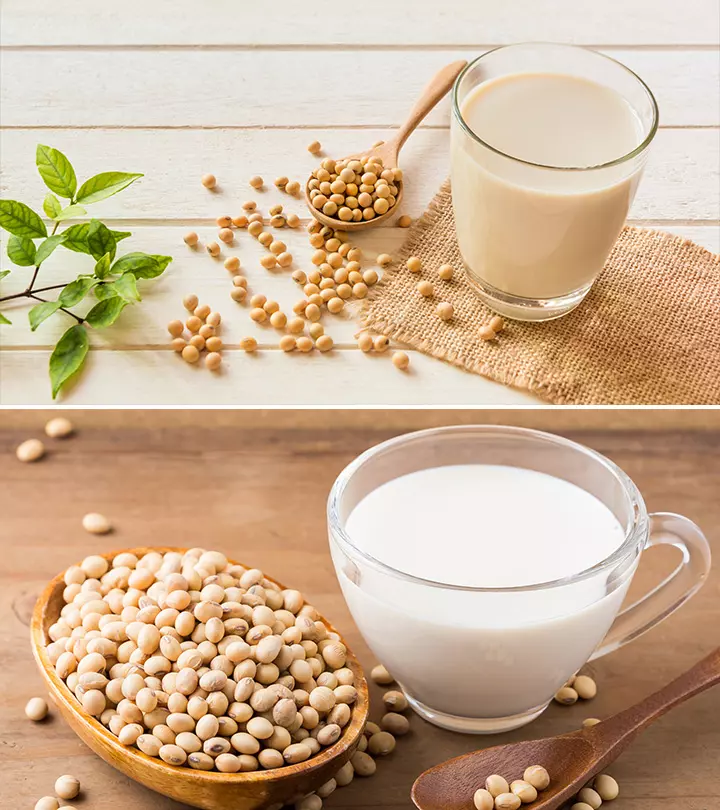
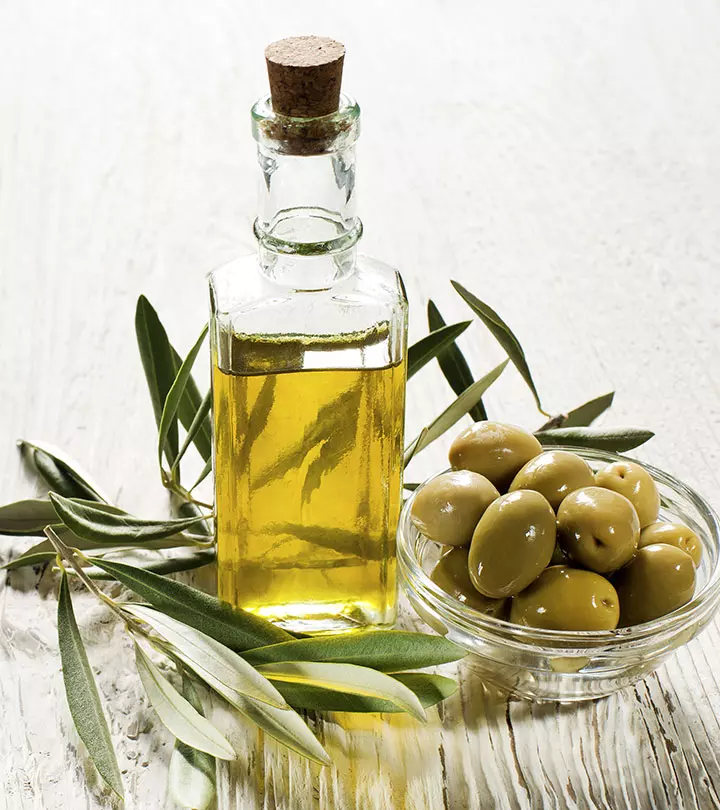
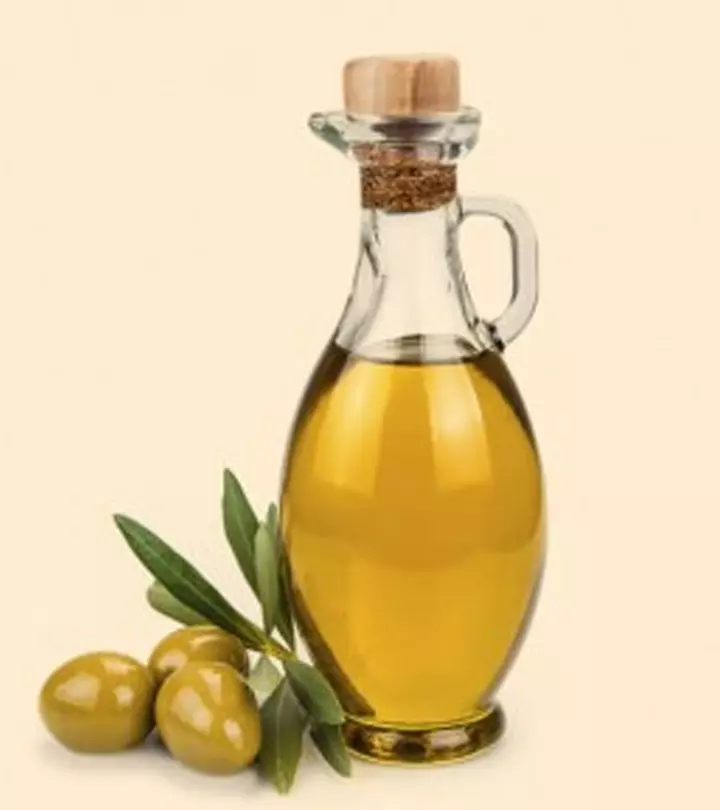
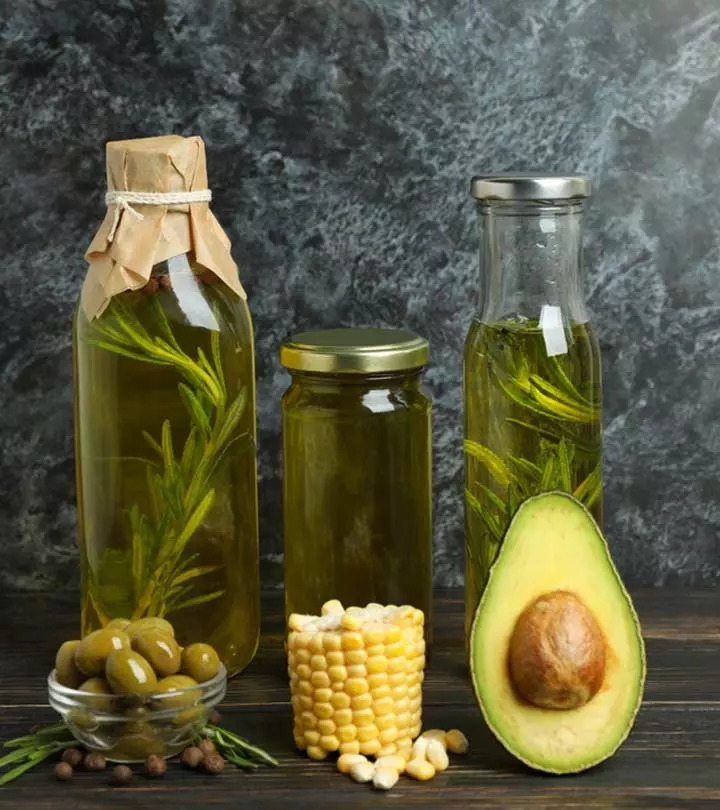



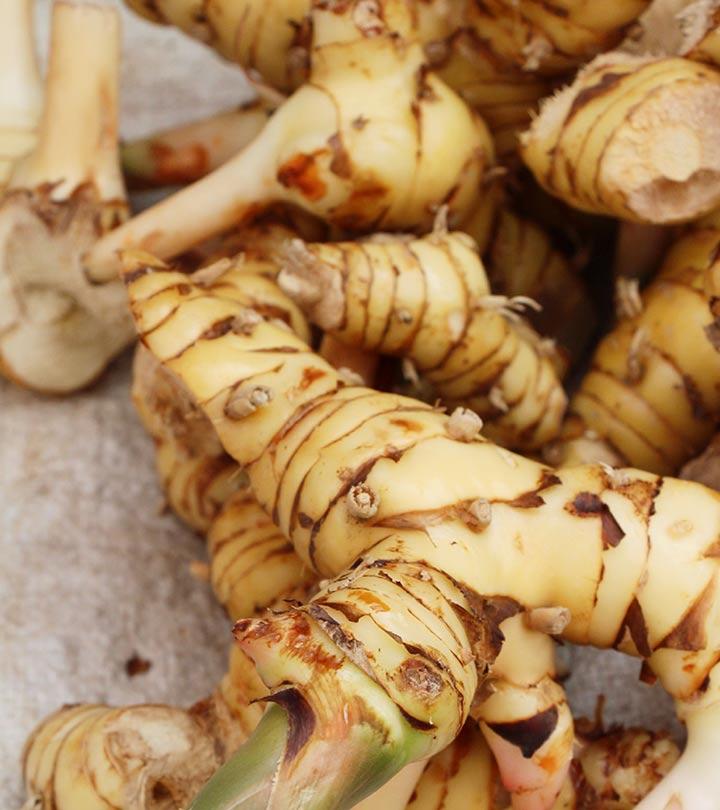
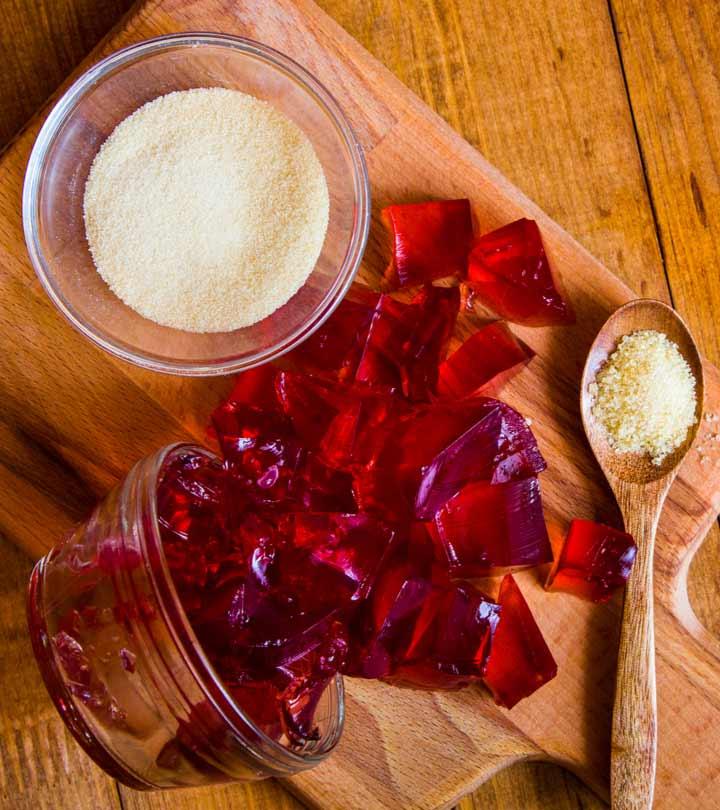
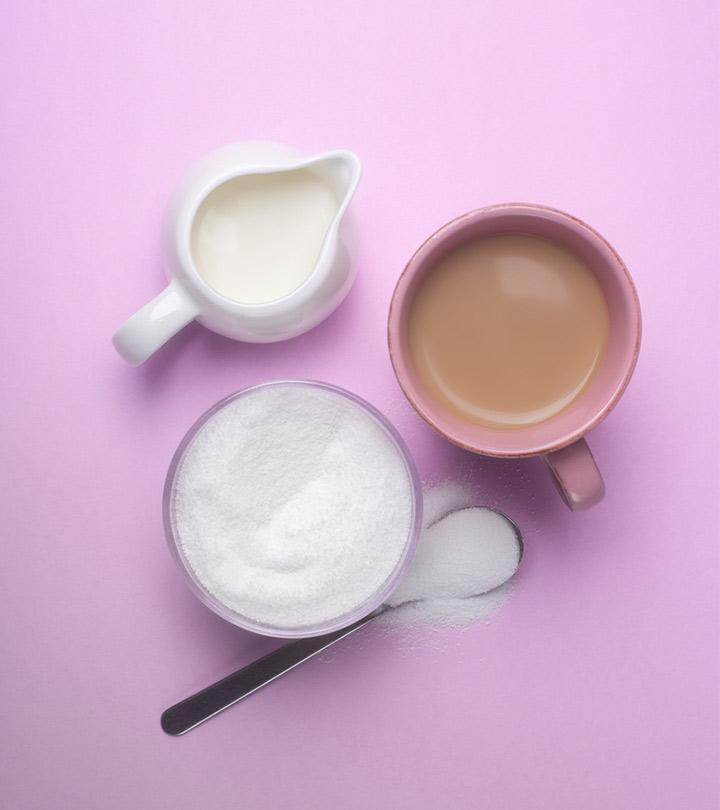
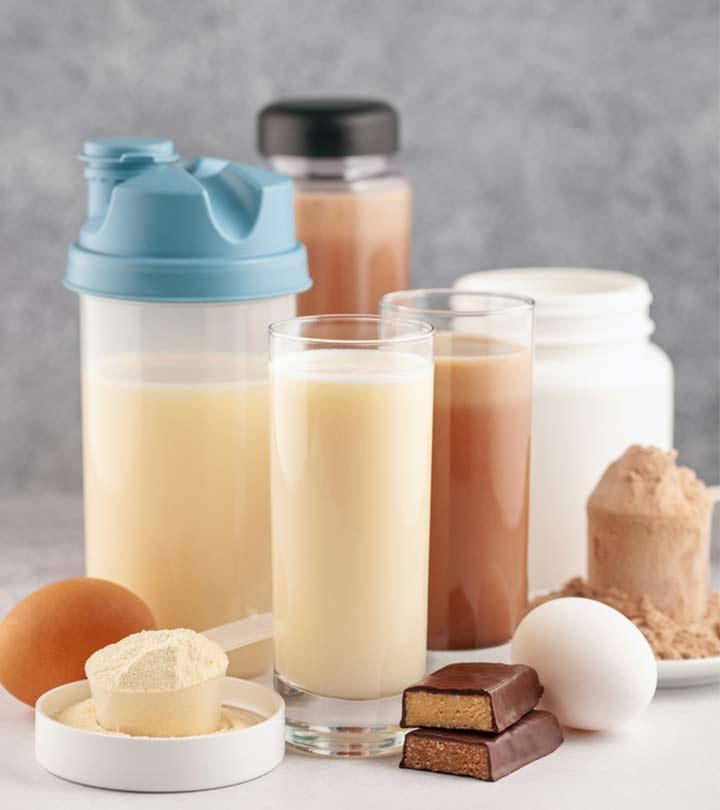


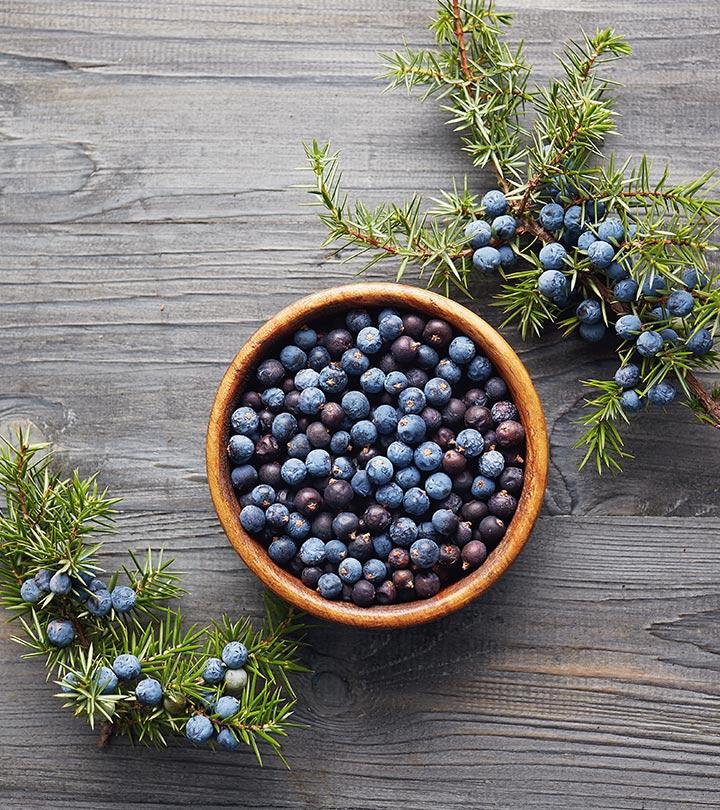

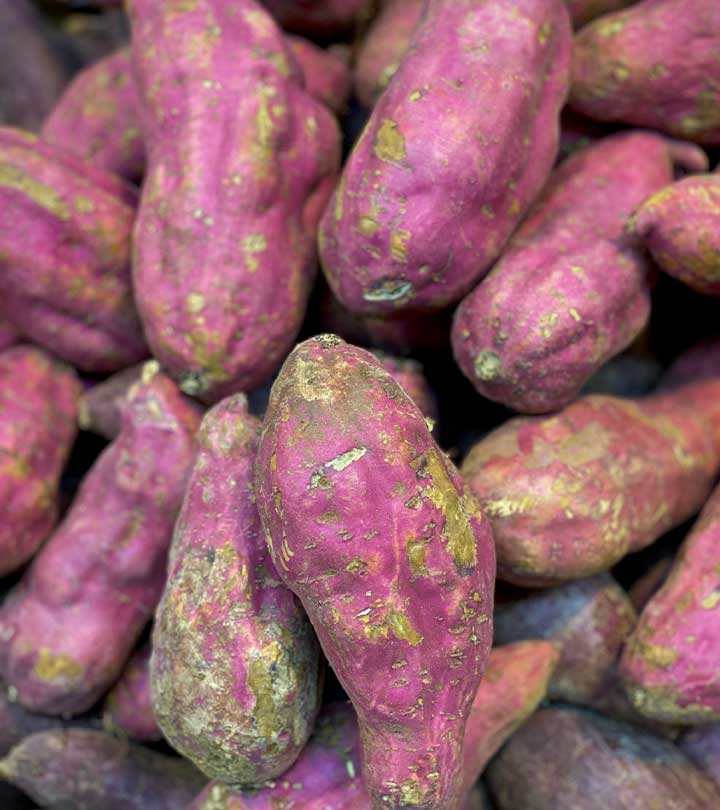
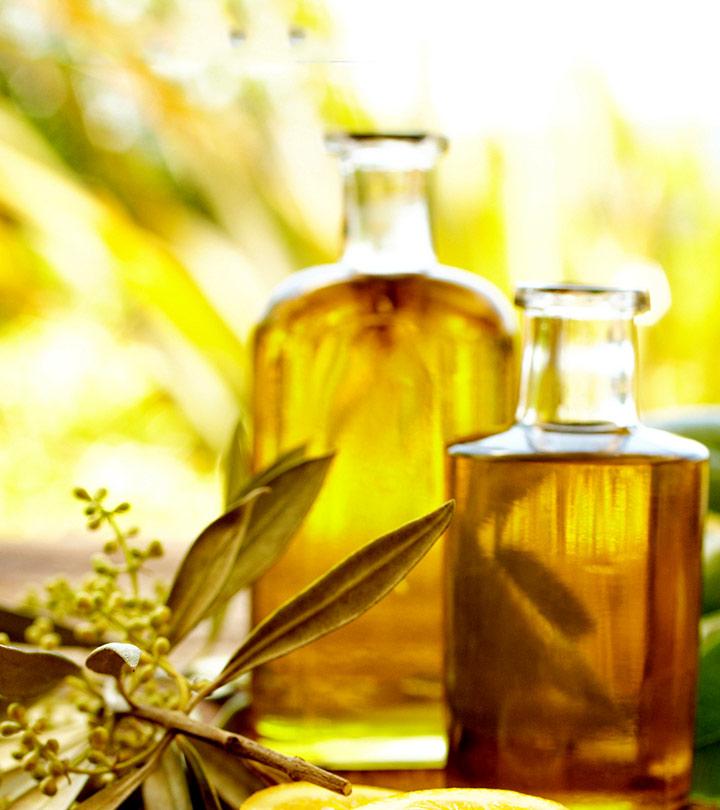
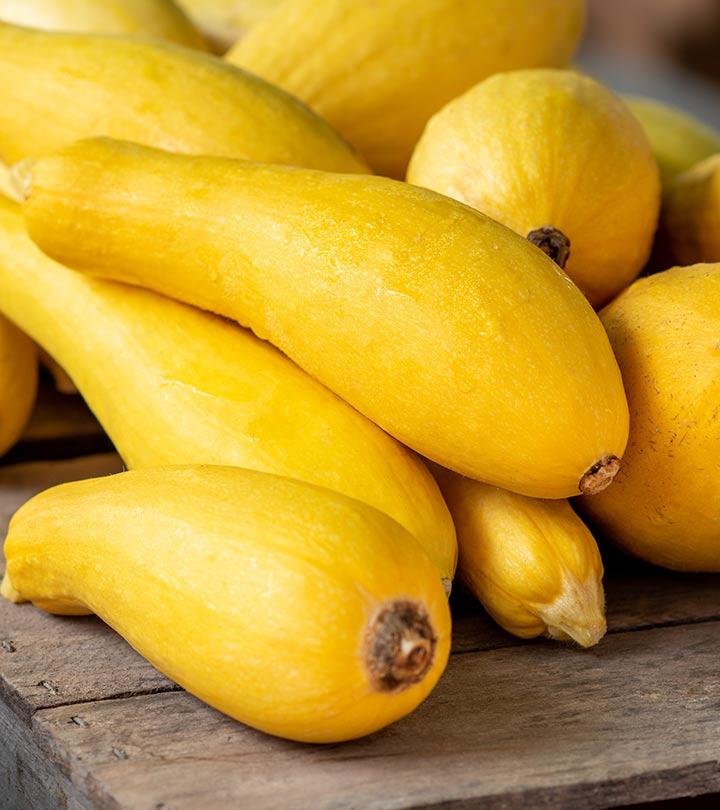
Community Experiences
Join the conversation and become a part of our empowering community! Share your stories, experiences, and insights to connect with other beauty, lifestyle, and health enthusiasts.